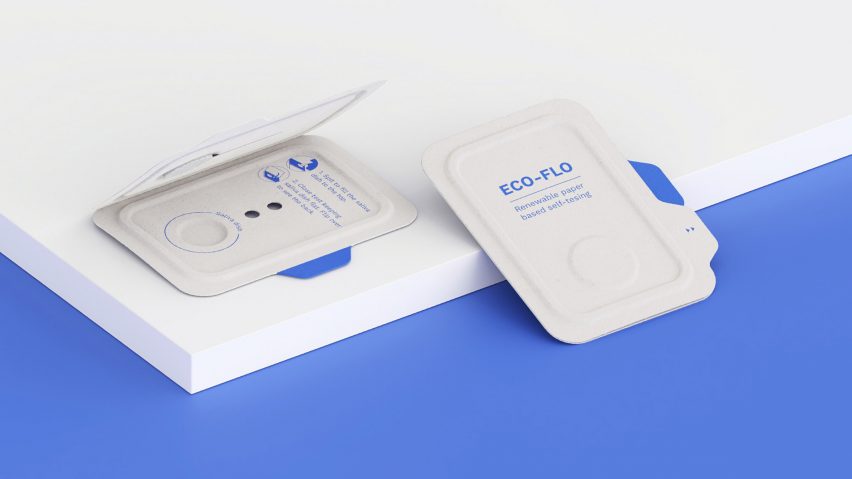Design agency Morrama has devised a concept for a Covid-19 test that is biodegradable and fully recyclable, right down to its packaging – potentially eliminating a common source of plastic waste.
The ECO-FLO test – which is, for the time being, a concept design only – would be the first in the world to be 100 per cent recyclable and biodegradable, according to Morrama.
The design agency devised the solution to cut down on the amount of single-use plastic generated by the pandemic. While both face masks and Covid-19 tests are at least partially recyclable, it is only through specialised facilities and not through residential collection, so must users have been advised to place them in the waste bin.
"At Morrama, we were inspired to create a test kit that doesn't contribute to the amount of plastic ending up in our landfills, so ECO-FLO was born," said the agency's founder and creative director Jo Barnard.
Morrama's proposal achieves this goal by making the test itself from moulded paper pulp, and its outer packaging from biodegradable NatureFlex film, which would both break down in approximately four to six weeks.
The other plastic elements – the swab, test tubes and their associated packaging – are all eliminated, as the agency rethought every step of the testing process to minimise materials and maximise ease of use.
Instead of the two mainstream test types on the market, polymerase chain reaction (PCR) and rapid antigen (lateral flow), ECO-FLO applies a new method called the Parallel Amplified Saliva rapid POint-of-caRe Test (PASPORT).
It works with only a saliva sample, so there is no need for buffer solution or a nasal swab – an element that can be difficult to use for those with disabilities or impairments, or when testing children.
The user would only need to spit on ECO-FLO's absorbent pad, close the test package and push the moulded button to transfer the sample from the absorbent pad to the test strip.
All of the instructions are printed directly on the test so there is no need for additional leaflets, and it is made more readable by replacing the currently used scientific notations – such as "C" for "control" and "T" for test – with simple checkboxes. In Morrama's conceptualisation, the packaging is the product.
"Thinking about the test as less of a product and more a piece of functional packaging really influenced the direction," Barnard told Dezeen.
"Packaging by its nature should always be designed for end-of-life, so we started not with a design, but with materials that can be recycled and recaptured."
While the need for Covid-19 tests may be in decline, Barnard says the ECO-FLO design remains relevant for countries still undertaking mass testing, such as China, which is disposing of over a million kits a day.
It would also assist groups with accessibility requirements, such as the young, old and those with mental health or learning difficulties.
However, Morrama is also positioning ECO-FLO as a provocation for the world to start thinking about sustainable design for future pandemics now.
"Whilst much of the Western world has moved on from mass testing of Covid-19, there has been regular warnings from experts that pandemics are only set to become more likely," said Barnard.
"With the failures from our response to Covid still fresh in our mind, we need to act now to ensure we are better prepared in the future."
For the concept to become a reality, PASPORT would need to be approved for use in at-home test; currently, it is still in trials. Cost should not be a barrier, as Morrama expects the required paper injection moulding or dry moulded fibre processing to be cost-competitive with plastic injection moulding at volume.
In the more immediate future, another British company, SureScreen Diagnostics, has announced it will start making a biodegradable Covid-19 test cartridge from plant-based materials, eliminating one source of plastic from the kits.
Morrama was founded in 2015. The agency's past projects include the minimal Angle razor, also aimed at reducing plastic waste, and a series of "smarter phone" concepts aimed at improving wellbeing.
Dezeen is on WeChat!
Click here to read the Chinese version of this article on Dezeen's official WeChat account, where we publish daily architecture and design news and projects in Simplified Chinese.

